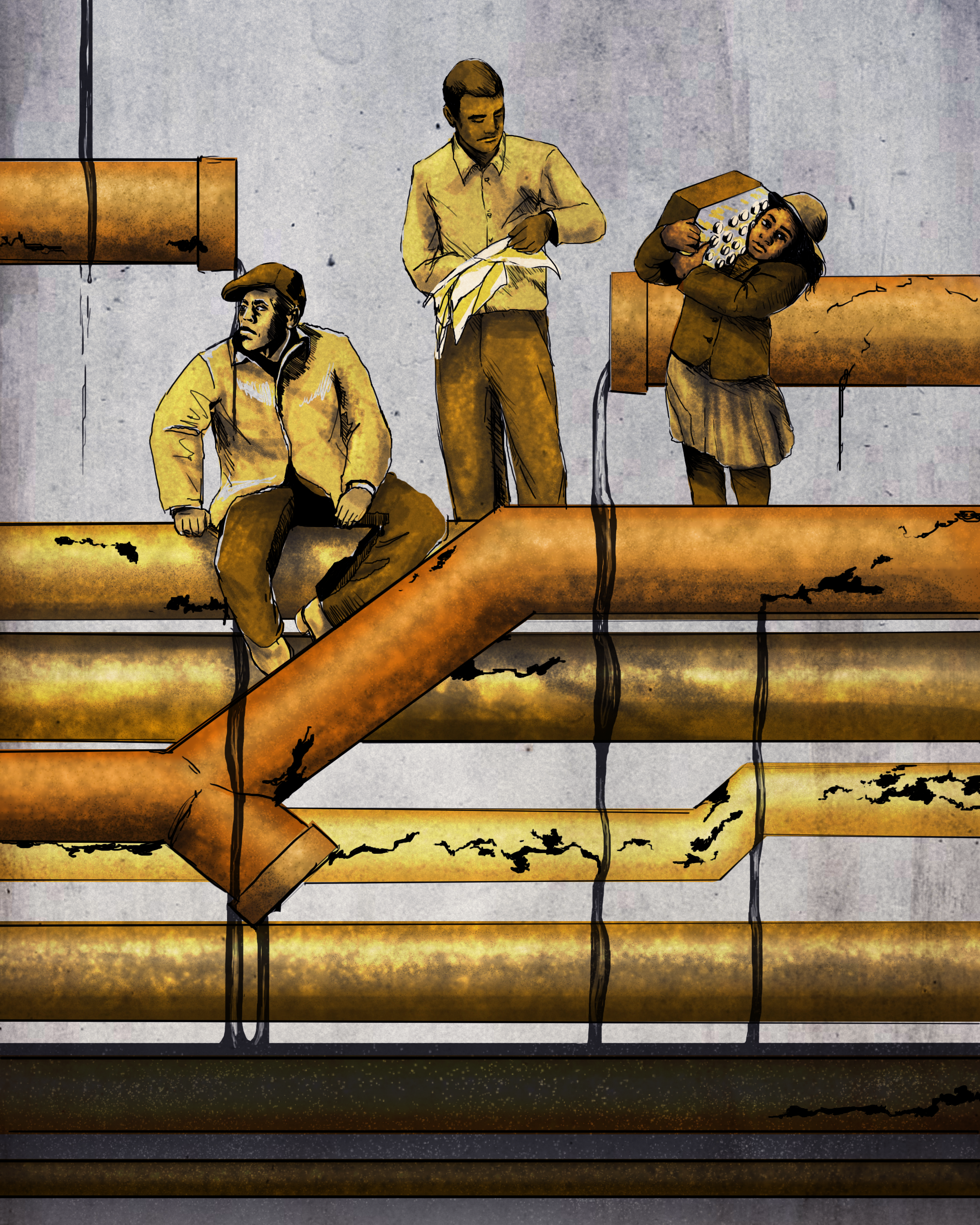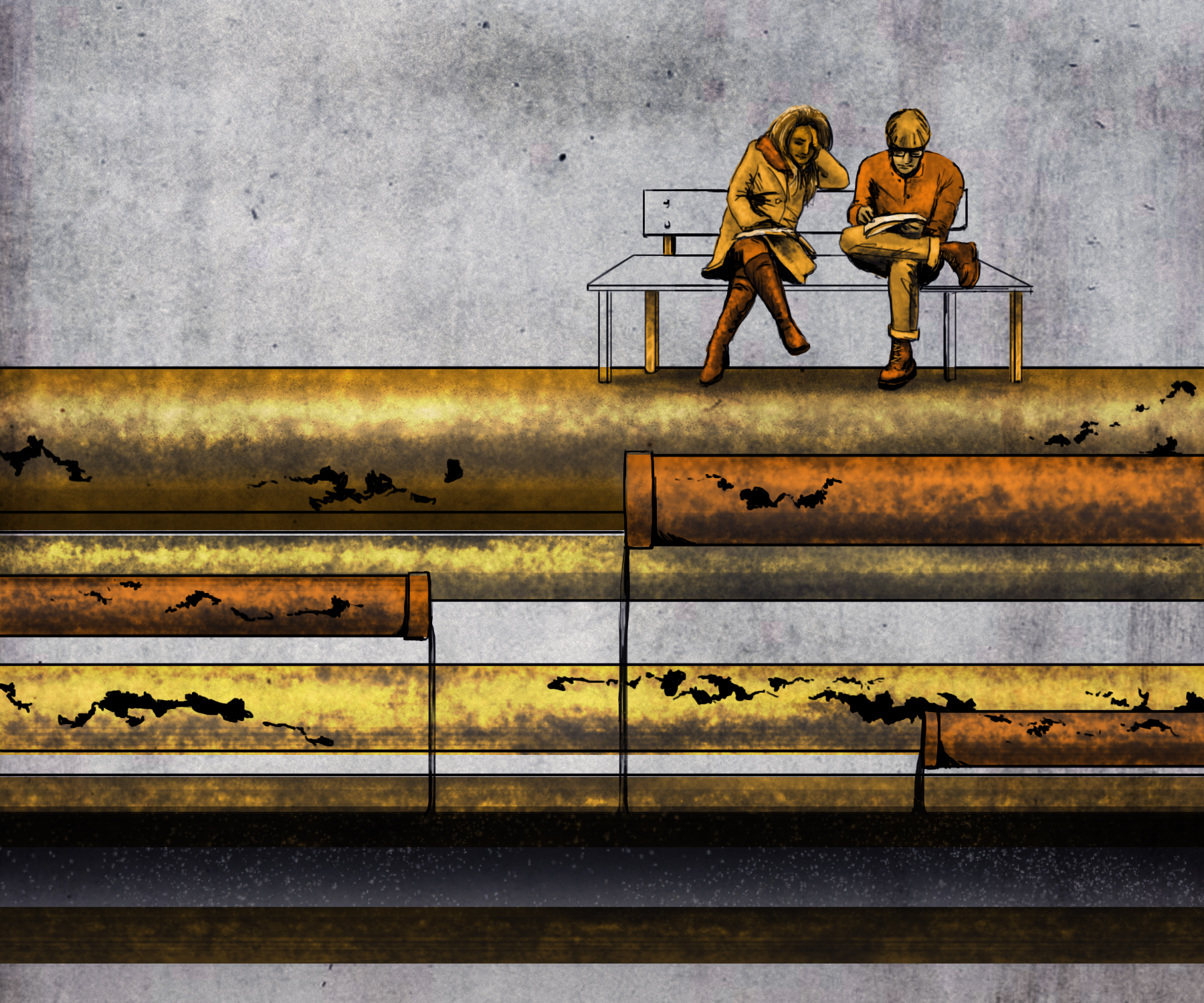“We need more engineers thinking about the human dimension.” – Dr. Marc Edwards

Featuring original artwork by Autumn Von Plinksy
This piece originally appeared in the Sage Magazine 2017 Print Edition: Justice Out of Place.
***
More than 300 men and women, hailing mostly from industry and state regulatory agencies await the keynote speaker at the Water Infrastructure Conference in Flint, Michigan. Governor Rick Snyder has not addressed the City of Flint for over a year. Outside, a small group of protesters picket at the entrance way to the conference center. And then there I am, a graduate student studying the Flint water crisis in the middle of it all.
In his opening remarks, Snyder enthusiastically refers to the conference as a “platform for changes and economic opportunity.” Flint Mayor Karen Weaver follows with a heartfelt welcome and a message of advice and hope: We must first recognize the problem and acknowledge that people made mistakes and then, and only then, can we together begin to work toward solutions. This conference, she emphasizes, is a step toward “economic equity.” Snyder did not hear these words. He had immediately left the building after his speech surrounded by body guards. Mayor Weaver stayed for the remainder of the conference. Her message of hope lingered in the air.
I couldn’t help but wonder if the Flint community felt any hope. When I first arrived in Flint, as I entered the city limits, I saw a large white cardboard sign stuck in someone’s yard that read, “Flint, a place to make great.” I drove through what seemed like empty streets, where similar signs sat outside beautiful old houses with boarded up windows and chipping paint. It was a community that felt distant from the twinkling white lights of the “Flint, The Vehicle City” archway that welcomes you downtown and the fancy bars, restaurants, bookshops and cafes that fill its store fronts.
In the hotel that first night, I hesitated to brush my teeth with water from the faucet. Just that day, community members had told me their stories. They told us that they are still using bottled water in their homes. That they have lost teeth. That their children’s hair has fallen out. That they no longer trust the water nor the pipes that bring it into their homes.
I looked in the bathroom mirror and felt conflicted not only about the water but also about coming to this city. Only two nights in a hotel and I was second-guessing everything. The tap water. The shower. The hotel pool. The water pitcher at breakfast. The reason why I had come here. Wasn’t I here to create a space for dialogue and try to support the community? Despite the reassurances of state and local authorities and the encouragement of my classmates, everything seemed to make me nervous and uncertain.
I would only be there for three days. The people of Flint have been living with this reality for two and a half years. While I worried, they waited for new pipes. They waited for the state to show up and collaborate with them for solutions. They waited for recognition. They waited for safe water.
The voice of Nayyirah Shariff, the Director of Flint Rising, stood out above the others on the last day of the conference as one of the few members of the Flint community invited to join.
“There is still a lot of uncertainty,” she said. “There is still a lot of trauma and pain that has to be dealt with. It has to be unpacked in an authentic way. I’m not sure if this is the space but there needs to be a space for that to happen.”
She asked the crowd, “How can this conference be a ‘platform for changes,’ when those who are affected by the crisis are not part of the conversation?”
Driving back to the airport, after co-leading our breakout group discussion, I passed through downtown under the Vehicle City archway and back down the empty streets. More than ever, I found myself searching for my place in all this. Should I continue to attend conferences like this where so many voices have been left unheard? Or should I take my place in line with the community protesters outside?
It became clear to me that I don’t need to make a decision one way or the other. Today, my place was inside. Tomorrow, I may stand with the protesters. The deep complexity of fighting for environmental justice will always necessitate adaptability and strength. The people of Flint have shown us how to achieve both in the face of uncertainty.
